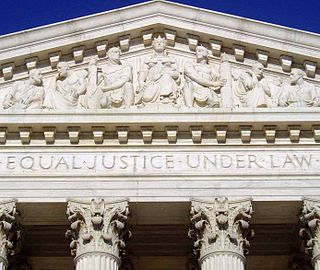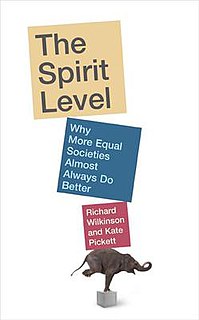 W
WAgainst Equality of Opportunity is a 2002 book by Matt Cavanagh. The work is a critique of the doctrine of equal opportunity. Cavanagh argues against the conventional understanding of equal opportunity, in particular both meritocracy and most substantial interpretations of equality, including the idea of ‘equal life chances’. Instead, he argues for a more limited approach of trying to eliminate specific kinds of discrimination, together with trying to provide enough opportunities, and help to access them, such that most people have some degree of control over their lives.
 W
WAsset-based egalitarianism is a form of egalitarianism which theorises that equality is possible by a redistribution of resources, usually in the form of a capital grant provided at the age of majority. Names for the implementation of this theory in policy include universal basic capital and stakeholding, and are generally synonymous within the equal opportunity egalitarian framework.
 W
WBunyip aristocracy is an Australian term satirising attempts by William Wentworth to establish a system of titles in the colony of New South Wales. It was coined in 1853 by Daniel Deniehy in what came to be known as the Bunyip Aristocracy speech which he delivered in the Victoria Theatre and on the soapbox at Circular Quay.
 W
WChristian egalitarianism, also known as biblical equality, is egalitarianism based in Christianity. In theological spheres, egalitarianism generally means equality in authority and responsibilities between genders, in contrast to complementarianism. This entails women being able to exercise spiritual authority as clergy. Christian egalitarians argue that verses cited to justify certain restrictions on women have been misunderstood, and support "mutual submission" of all people to each other in relationships and human institutions as a form of respect without necessarily requiring a hierarchy in authority.
 W
WConsensus decision-making or consensus politics is group decision-making processes in which participants develop and decide on proposals with the aim, or requirement, of acceptance by all. The focus on avoiding negative opinion differentiates consensus from unanimity, which requires all participants to positively support a decision.
 W
WEgalitarian dialogue is a dialogue in which contributions are considered according to the validity of their reasoning, instead of according to the status or position of power of those who make them. Although previously used widely in the social sciences and in reference to the Bakhtinian philosophy of dialogue, it was first systematically applied to dialogical education by Ramón Flecha in his 2000 work Sharing Words. Theory and Practice of Dialogic Learning.
 W
WEgalitarianism as a Revolt Against Nature and Other Essays is a 1974 book by economist Murray Rothbard. The book represents the author's theorizing on topics impacting human liberty. Rothbard looks beyond conventional left-right thinking and hence contributes to the groundwork for the current intellectual challenge against centralized social and economic management.
 W
WEqual justice under law is a phrase engraved on the West Pediment, above the front entrance of the United States Supreme Court building in Washington D.C. It is also a societal ideal that has influenced the American legal system.
 W
WThe Equal Protection Clause is part of the first section of the Fourteenth Amendment to the United States Constitution. The clause, which took effect in 1868, provides "nor shall any State ... deny to any person within its jurisdiction the equal protection of the laws". It mandates that individuals in similar situations be treated equally by the law.
 W
WEquality before the law, also known as equality under the law, equality in the eyes of the law, legal equality, or legal egalitarianism, is the principle that each independent being must be treated equally by the law and that all are subject to the same laws of justice. Therefore, the law must guarantee that no individual nor group of individuals be privileged or discriminated against by the government. Equality before the law is one of the basic principles of liberalism. This principle arises from various important and complex questions concerning equality, fairness and justice. Thus, the principle of equality before the law is incompatible and ceases to exist with legal systems such as slavery, servitude.
 W
WEquality of outcome, equality of condition, or equality of results is a political concept which is central to some political ideologies and is used regularly in political discourse, often in contrast to the term equality of opportunity. It describes a state in which people have approximately the same material wealth and income, or in which the general economic conditions of their lives are alike.
 W
WEquality of sacrifice is a term used in political theory and political philosophy to refer to the perceived fairness of a coercive policy.
 W
WEquinet is the European Network of Equality Bodies. It serves as a professional platform for cooperation, capacity building and peer support amongst equality bodies around the legal interpretation and implementation in practice of the EU equal treatment Directives and around the promotion of equality and the elimination of discrimination.
 W
WHuman rights in Dubai are based on the Constitution and enacted law, which supposedly promise equitable treatment of all people, regardless of race, nationality or social status, per Article 25 of the Constitution of the United Arab Emirates. Despite this, Freedom House has stated: "Extreme forms of self-censorship are widely practiced, particularly regarding issues such as local politics, culture, religion, or any other subject the government deems politically or culturally sensitive. The Dubai Media Free Zone (DMFZ), an area in which foreign media outlets produce print and broadcast material intended for foreign audiences, is the only arena in which the press operates with relative freedom."
 W
WThe International Association for Feminist Economics (IAFFE) is a non-profit international association dedicated to raising awareness and inquiry of feminist economics. It has approximately six hundred members in sixty-four countries. The association publishes a quarterly journal entitled Feminist Economics. Since 1998 IAFFE has held NGO special consultative status.
 W
WLesbian, gay, bisexual, and transgender (LGBT) social movements are social movements that advocate for LGBT people in society. Social movements may focus on equal rights, such as the 2000s movement for same-sex marriage, or they may focus on liberation, as in the gay liberation movement of the 1960s and 1970s. Earlier movements focused on self-help and self-acceptance, such as the homophile movement of the 1950s. Although there is not a primary or an overarching central organization that represents all LGBT people and their interests, numerous LGBT rights organizations are active worldwide. The earliest organizations to support LGBT rights were formed in the early 20th century.
 W
WLiberté, égalité, fraternité, French for "liberty, equality, fraternity", is the national motto of France and the Republic of Haiti, and is an example of a tripartite motto. Although it finds its origins in the French Revolution, it was then only one motto among others and was not institutionalized until the Third Republic at the end of the 19th century. Debates concerning the compatibility and order of the three terms began at the same time as the Revolution. It is also the motto of the Grand Oriente and the Grande Loge de France.
 W
WIn Greek mythology, Procrustes, also known as Prokoptas or Damastes, was a rogue smith and bandit from Attica who attacked people by stretching them or cutting off their legs, so as to force them to fit the size of an iron bed.
 W
WRedistribution of income and wealth is the transfer of income and wealth from some individuals to others by means of a social mechanism such as taxation, charity, welfare, public services, land reform, monetary policies, confiscation, divorce or tort law. The term typically refers to redistribution on an economy-wide basis rather than between selected individuals.
 W
WScott Sunken Garden is a historical landmark in Lansing, Michigan, United States of America.
 W
WThe Spirit Level: Why More Equal Societies Almost Always Do Better is a book by Richard G. Wilkinson and Kate Pickett, published in 2009 by Allen Lane. The book is published in the US by Bloomsbury Press with the new sub-title: Why Greater Equality Makes Societies Stronger. It was then published in a paperback second edition in November 2010 by Penguin Books with the subtitle, Why Equality is Better for Everyone.
 W
WYouth empowerment is a process where children and young people are encouraged to take charge of their lives. They do this by addressing their situation and then take action in order to improve their access to resources and transform their consciousness through their beliefs, values, and attitudes. Youth empowerment aims to improve quality of life. Youth empowerment is achieved through participation in youth empowerment programs. However scholars argue that children's rights implementation should go beyond learning about formal rights and procedures to give birth to a concrete experience of rights. There are numerous models that youth empowerment programs use that help youth achieve empowerment. A variety of youth empowerment initiatives are underway around the world. These programs can be through non-profit organizations, government organizations, schools or private organizations.